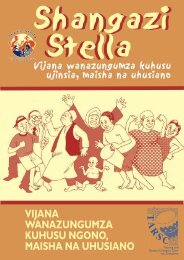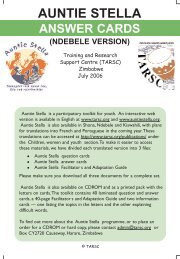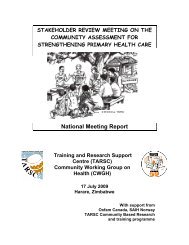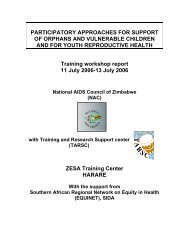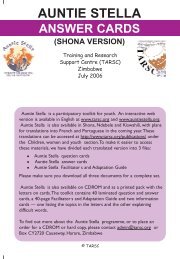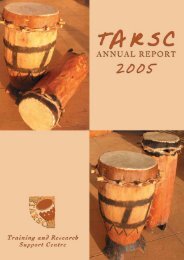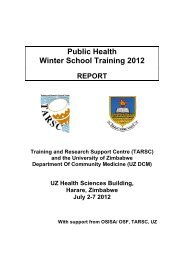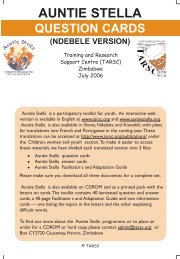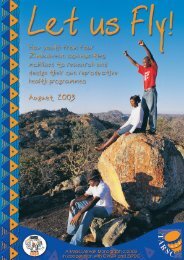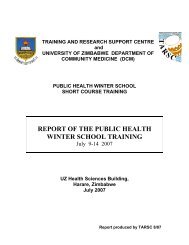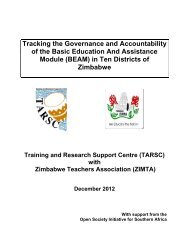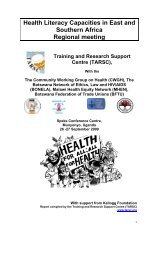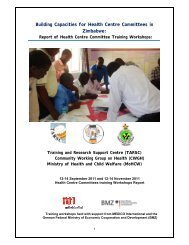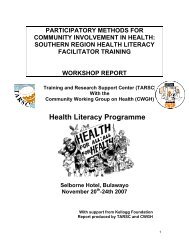WS10 Report.pdf - Training and Research Support Centre
WS10 Report.pdf - Training and Research Support Centre
WS10 Report.pdf - Training and Research Support Centre
You also want an ePaper? Increase the reach of your titles
YUMPU automatically turns print PDFs into web optimized ePapers that Google loves.
Participants were selected from applicants to an open call, <strong>and</strong> a total of 33 participants<br />
attended the course. Participants included district level officers from various government<br />
ministries, non governmental organisations, civil society <strong>and</strong> research organisations<br />
working on HIV <strong>and</strong> AIDS <strong>and</strong> nutrition programmes <strong>and</strong> workers’ representatives.<br />
Participants came from or worked in various districts across the country. The full list of<br />
participants is shown in Appendix 3.<br />
The course involved teaching, presentations <strong>and</strong> mentored assignments. The course<br />
programme is shown in Appendix 1. Students carried out two mentored assignments<br />
during the course to consolidate their knowledge in areas of Public health, <strong>and</strong> Health<br />
systems.<br />
H<strong>and</strong>outs were provided for each session in the programme, <strong>and</strong> a list of reference<br />
materials <strong>and</strong> useful websites made available for follow up reading on subject areas. An<br />
end of course test was completed <strong>and</strong> certificates of completion were given at the end of<br />
the course.<br />
The resource persons <strong>and</strong> facilitators for the course came from the University of<br />
Zimbabwe, <strong>Training</strong> <strong>and</strong> <strong>Research</strong> <strong>Support</strong> <strong>Centre</strong>, Ministry of Health <strong>and</strong> Child Welfare,<br />
Zimbabwe Health Services Board (ZHSB), Non governmental organisations <strong>and</strong> United<br />
Nations agencies (Community Working Group on Health (CWGH), Elizabeth Glazier<br />
Foundation, UNFPA, UNICEF), Local government, Parliament of Zimbabwe <strong>and</strong> City of<br />
Harare Health Department. Sessions were accompanied by h<strong>and</strong>outs <strong>and</strong> course<br />
materials. Two assignments were done by the students in groups to test their public<br />
health <strong>and</strong> health systems knowledge. An end of course test was completed <strong>and</strong> all<br />
students passed.<br />
Students completed a course evaluation form at the end of the training to give feedback<br />
on the strengths <strong>and</strong> weaknesses of the training. The evaluation indicated that students<br />
found the course relevant to their work was useful. The full results of the evaluation are<br />
shown in Appendix 2.<br />
The course was jointly administered by UZ DCM <strong>and</strong> TARSC. Proceedings of the one<br />
week training course are briefly outlined below. A full set of h<strong>and</strong>outs <strong>and</strong> reading<br />
materials is provided with the course. The sessions provided time for questions <strong>and</strong><br />
discussion- these elaborate discussions are not reported here but were an essential<br />
element of each session. Mentors inputs to participants’ group assignments are however<br />
reported in brief as are the discussions in the panel discussion on non health sector<br />
roles in health.<br />
2. The course<br />
2.1 Introduction to the course<br />
Dr Rene Loewenson (TARSC Director) <strong>and</strong> Professor S Rusakaniko (UZ DCM Chair)<br />
welcomed the participants to the course. Participants introduced themselves, noting their<br />
areas of work <strong>and</strong> expectations from the training. Dr Rene outlined the background to<br />
the course, course overview, target audience <strong>and</strong> objectives (as highlighted in the<br />
introduction above). She stressed that follow ups on the use of the course would be<br />
done to evaluate the effectiveness of the training <strong>and</strong> identification of any further gaps in<br />
skills. Professor Rusakaniko went through the programme (as shown in Appendix 1)<br />
highlighting the issues to be covered <strong>and</strong> their relevance.<br />
4



